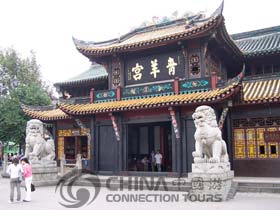
The Qingyang Palace (Grey Goat Palace), located in the west suburbs of Chengdu, relying on the bank of Jinjiang River, is a famous Taoist temple. It is one of the oldest and most extensive Taoist temples in Chengdu area. First built during the Zhou Dynasty (1022-486BC), the Qing Yang Palace served as a place of worship for Taoists through the Tang, Song, Yuan, Ming, and Qing dynasties, making it one of China's most famous and ancient Taoist temples.
 The story goes that Lao Tzu, the high priest of Taoism, asked a friend to meet him there. When the friend arrived he saw only a boy leading two goats on a leash. In a fabulous move of lateral thinking he realized the boy was Lao Tzu. According to this story, a Taoist palace was built there with the two symbolic bronze goats. The present palace was built in the Qing Dynasty (1644-1911 AD). Its major structures include Lingzu Hall, Hunyuan Building, Wuji Hall and Bagua Pavilion. In the compound, stand two eye-catching bronze goats. Although called a goat, one of them is actually a strange creature with mouse ears, an ox nose, tiger paws, rabbit back, snake tail, dragon horns, horse mouth, goat beard, monkey neck, chicken eyes, dog belly and pig thighs. It was said that this goat has some supernatural powers and anyone who touch it could survive from illness and mischance. On February 15th of The Chinese Lunar calendar, a temple fair is held there to celebrate the birthday of flowers.
The story goes that Lao Tzu, the high priest of Taoism, asked a friend to meet him there. When the friend arrived he saw only a boy leading two goats on a leash. In a fabulous move of lateral thinking he realized the boy was Lao Tzu. According to this story, a Taoist palace was built there with the two symbolic bronze goats. The present palace was built in the Qing Dynasty (1644-1911 AD). Its major structures include Lingzu Hall, Hunyuan Building, Wuji Hall and Bagua Pavilion. In the compound, stand two eye-catching bronze goats. Although called a goat, one of them is actually a strange creature with mouse ears, an ox nose, tiger paws, rabbit back, snake tail, dragon horns, horse mouth, goat beard, monkey neck, chicken eyes, dog belly and pig thighs. It was said that this goat has some supernatural powers and anyone who touch it could survive from illness and mischance. On February 15th of The Chinese Lunar calendar, a temple fair is held there to celebrate the birthday of flowers.

